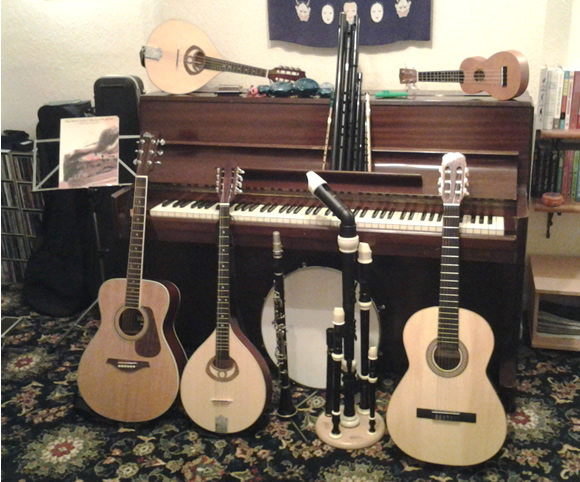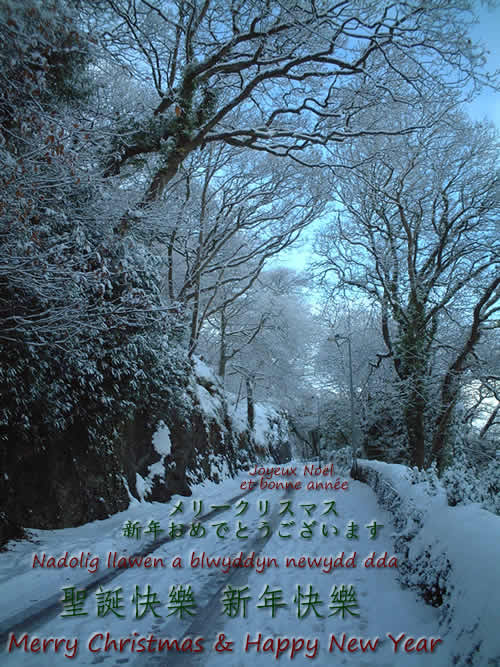– apprenti(e) = apprentice = prentis = deskard
– apprentissage = apprenticeship = prentisiaeth = deskardelezh
– le porte-clefs/porte-clés = key ring / chain / fob = torch allwedd = doug alc’hwezoù
– l’anneaux porte-clefs = key ring = torch allwedd = (?)
– une clé/clef de rechange / une autre (clef) = spare key = allwedd sbâr = alc’hwez da drok (?)
– un roue de rechange/de secours = spare wheel = olwyn sbâr = rod-eskemm
– l’ouïe (f) = hearing = clyw = kleved / klev
– être dur(e) d’oreille = to be hard of hearing = bod yn drwm dy glyw = bezañ fall e gleved, bezañ teñvalglev
– la brasserie = brewery = bracty, bragdy = bierezh, breserezh
– (nez) camus = pug nose = trwyn smwt = fri-togn
Category: French (français)
Les mots de la semaine
– l’appareil auditif/acoustique (m) = hearing aid = teclyn clywed = adskouarn / klevosod
– la piste = track, tracks, trail; lead, course = llwbyr, ôl, trywydd = hent, roudenn
– la piste cyclable = cycle track = llwybr beic = roudenn belo (?)
– bégayer = to stammer = siarad ag atal = gagiñ
– l’accompagnement (m) la garniture = trimmings = trimins = ambroug, gwarnitur
– les nouvelles = news = newyddion = news
– le bulletin d’informations = news broadcast/bulletin = bwletin/darllediad newyddion = lizher kelaouiñ
– la conférence de presse = press/news conference = cynhadledd newyddion = emvod kelaouiñ
– la marine = navy = llynges = marin, mordeadurezh
– une fin heureuse = a happy ending = diwedd hapus = echuiñ eürus (?)
– la noces = wedding = priodas = dimez
– le voyage de noces (voyage), la lune de miel (période) = honeymoon = mis mêl = miz mel
Selective attention
The other day an English guy who has lived in Wales for many years and who doesn’t speak Welsh told me that when he listens to people speaking Welsh, he hears lots of English words, words derived from English, and words from French or Latin, so he believes that Welsh is made up mainly of such words.
I suggested that such words just seemed to be prominent and ubiquitous because they are the only ones he understands, and that the majority of Welsh words are completely different, though they share the same ultimate roots as words in most other European languages.
He wasn’t convinced, and when asked for examples, could only think of a few: parcio (parking) and ffenestr (window) and pont (bridge).
I can understand why he’s convinced that there are lots of words of English, French and Latin origin in Welsh – selective attention. It’s like if someone says that you don’t see many yellow cars around, you will start to notice ever yellow car and might become convinced that they are more common than they really are.
Have you any mistaken impressions of languages you don’t know?
When I first heard spoken Irish I thought it was mainly made up of the occasional English word, plus lots of agus (and), and mumbling in an Irish accent. Now I know better.
Seasons Greetings!
Fy filodfa gerddorol
Mae’r nifer o offerynnau yn fy filodfa gerddorol wedi cynyddu eleni, ac mae gen i 30 o offerynnau bellach. Yr offeryn mwyaf newydd ydy piano, sy wedi cyrraedd Dydd Gwener diwetha. Piano ail law ydy o, a dw i wedi ei brynnu o eBay o ddyn yn Salford.
Ar hyn bryd mae gen i piano, iwcalili, mandolin, bouzouki, bodhrán, xaphoon, clarinét, casŵ, ffliwt, dau gitâr, dau harmonica, a cryn dipyn o recorderau, chwibanau ac ocarinas.

My musical menagerie has grown quite a bit this year and now includes 30 instruments. The newest addition was a piano, which arrived last Friday. It’s a second hand piano that I bought on eBay from a bloke in Salford.
The menagerie currently consists of: a piano, a ukulele, a mandolin, a bouzouki, a bodhrán, a xaphoon, a clarinet, a kazoo, a flute, two guitars, two harmonicas, and quite a few recorders, whistles and ocarinas.
Les mots de la semaine
– être/rester coincé/bloqué = to be stuck = bod yn sownd = stankañ
– se coincer/bloquer = to get stuck
– être enlisé = to be stuck (in mud/sand) = bod yn sownd (yn llaca/tywod) = sac’hellañ
– s’enlisé = to get stuck (in mud/sand)
– à mi-chemin = half-way (in distance) = hanner ffordd = hanter hent
– à la moitié de = half-way (activity/time) = hanner ffordd = hanter
– surveiller = to supervise = arolygu, goruchwylio = evezhiañ
– la laverie automatique = laundrette = laundrette, siop golchi dillad = kanndi, kannerezh
– la mamelle, le pis = udder = cadair, pwrs, piw = bronn
– le pis-aller = stopgap = perth dros dro = defot gwell
– le chargement = load = llwyth = kargañ
– la bûche = log = boncyff = kef
– le bûcheron = logger, lumberjack = coetmon = keuneuder, koadour
– les paroles = lyrics = telynegion = gerioù
Blue stones
An interesting Breton word I came across today is mein-glas, or slates (literally, ‘blue stones’). The French equivalent is ardoises, which I had to look up as it’s not a word that crops up every day, unless you’re a roofer or builder.
The Breton word is made up of mein (stones – singular maen) and glas (blue/green), and the French word is of uncertain, possibly Gaulish origin – the ard part might come from the Gaulish word *ard(u) (high), as in the Ardennes [source]. The ard element is also found in the Gaelic languages meaning high, tall, elevated.
Ardoise (slate) appears in such terms as:
– ardoise électronique = notepad computer
– bleu/gris ardoise = blue/grey slate
– toit en ardoise = slate roof
– carrière d’ardoise = slate quarry
Les mots de la semaine
– le fil électrique = (electical) wire = gwifren (trydanol), weiar (trydanol) = neudenn (dredan), orjalenn (dredan)
– le fil de fer = (metal) wire = gwifren, weiar = neud-orjal
– en moyenne = on average = ar gyfartaledd = keitad
– le rendez-vous = appointment = apwyntiad, trefniad = emgav
– l’entretien (m) = interview = cyfweliad = emziviz
– la plaque chauffante = griddle = gradell = plakenn-dommañ (?)
– le niveau de vie (élevé/bas) = (high/low) standard of living = safon byw (uchel/isel) = live bevañ (uhel/izel)
– le contact avec les malades / le comportement envers les malades = bedside manner = emzalc’h gant ar glañvourien (?)
– Il a un bon contact avec ses malades = he has a good bedside manner
– le diagnostic = diagnosis = diagnosis = diagnostik
– saper, déstabiliser qn = to undermine = tanseilio = disfontañ
– il était bien pomponné = he was all poshed up
Kig yar gant piz-bihan
The more Breton I learn, the more connections I am finding with Welsh, and to some extent with French, in terms of vocabulary. Today’s lesson, for example, includes these words:
– korn = cornel (corner)
– straed= stryd (street) – e korn ar straed = ar gornel y stryd (on the street corner)
– iliz = eglwys (church)
– marc’had-mat (‘good market’) = rhad (cheap) – looks like a calque translation from the French bonne-marché
– kig = cig (meat)
– kig yar (‘hen meat’) = cyw iâr (chicken)
– piz-bihan = pys (peas) – looks like a calque of petit-pois.
– tartezenn avaloù = pastai afal (apple tart/pie)
– enez = ynys (island)
Yesterday we had deiz = dydd (day), beure = bore (morning), and noz = nos (night). The spelling and pronunciation disguises the related words, but once you get used to it, you can spot them more easily. It took me a while to realise that beure = bore.
Русский & français
Last Saturday at my brother’s wedding I had plenty of opportunities to use my Russian – my brother’s wife is Russian, and while she speaks very good English, few of her family speak any, so I did my best to speak with them in Russian. I was able to have some basic conversations, with help from the Ukrainian bridesmaid, who speaks Ukrainian, Russian and English. I wasn’t worried about making mistakes, just trying to communicate, and managed to do so reasonably well. It was a little difficult to explain that I live in Wales and that it isn’t part of England, but is part of the UK.
I also had a chance to speak French as the bride’s brother-in-law speaks it – he learnt it in school and he visits France regularly on business – and there there were a couple of French people there – one of whom is the bridesmaid’s husband. So it was quite an international and multilingual gathering.
Russian is starting to sound more familiar now and I’m getting better at reading it. I don’t understand a lot much, but am continuing to learn a bit more every day and making progress.
